About Us
The College of Arts and Sciences was established on January 11, 1966 by the University of Northern Philippines–Board of Regents through Resolution No. 13, s. 1996. The Resolution states that “the organization of the Colleges of Industrial Education, Arts and Sciences, and Engineering be approved in principle depending upon the availability of funds.” The College thus is among the first academic units that were established following the creation of the University through Republic Act 4449 authored by the late Congressman Floro S. Crisologo on June 19, 1965. It started operating in SY 1967-1968 with the offering of Bachelor of Arts major in: English, Political Science, Psychology, History, and Guidance. The College also serviced all other academic units by offering the general education subjects to all first year and second year students. In the early 70s, departments were created in the College: Departments of Languages and Humanities, Socio-Behavioral Sciences, Breeder Sciences, Mathematics, and Physical Education. Eventually, more academic units were created offering more courses including the general education subjects.
In the 80s, the College started to offer Bachelor of Science in Biology, Bachelor of Science in Mathematics, and Bachelor of Science in Physics. In the 90s, programs were added in response to the needs of the times: Bachelor of Science in Computer Science (now offered by the College of Computer and Information Technology), Bachelor of Science in Environmental Science, Bachelor of Arts in Psychology (as a straight program), and the double majors AB English/Mass Communication, AB Political Science/History, and BS Mathematics/Statistics. A little later came AB in Tourism (now offered by the College of Hospitality and Tourism Management) and BS Biology (Marine). In 2011, Bachelor of Arts in Psychology was revised to Bachelor of Science in Psychology and Bachelor of Arts in English/Mass Communication was renamed to Bachelor of Arts in Communication. In 2014, the College started offering Master of Statistics which was first offered in 1994 at the Graduate School.
The College continuously reviews its curricula to conform with the policies and standards of the Commission on Higher Education. Likewise, its academic programs undergo monitoring and assessment by the Regional Quality Assurance Team (RQAT), the CHED Technical Panels for the various disciplines, and the Accrediting Agency of Chartered Colleges and Universities of the Philippines (AACCUP).
The implementation of the K to 12 program resulted to the revision of the programs offered in the College based on new CMOs.
In January 2020, under the administration of Dr. Erwin F. Cadorna, the general education subjects were fused with the academic programs under the umbrella of the College of Arts and Sciences. Given its new structure, the College is presently being administered by a Dean and two Assistant Deans. The Assistant Dean for Academic Programs is assisted by the Program Heads, whereas the Assistant Dean for the General Education Courses, by the Heads of the different departments (Social Sciences and Philosophy, Language and Humanities, Mathematics and Natural Sciences, and Physical Education).
In the 80s, the College started to offer Bachelor of Science in Biology, Bachelor of Science in Mathematics, and Bachelor of Science in Physics. In the 90s, programs were added in response to the needs of the times: Bachelor of Science in Computer Science (now offered by the College of Computer and Information Technology), Bachelor of Science in Environmental Science, Bachelor of Arts in Psychology (as a straight program), and the double majors AB English/Mass Communication, AB Political Science/History, and BS Mathematics/Statistics. A little later came AB in Tourism (now offered by the College of Hospitality and Tourism Management) and BS Biology (Marine). In 2011, Bachelor of Arts in Psychology was revised to Bachelor of Science in Psychology and Bachelor of Arts in English/Mass Communication was renamed to Bachelor of Arts in Communication. In 2014, the College started offering Master of Statistics which was first offered in 1994 at the Graduate School.
The College continuously reviews its curricula to conform with the policies and standards of the Commission on Higher Education. Likewise, its academic programs undergo monitoring and assessment by the Regional Quality Assurance Team (RQAT), the CHED Technical Panels for the various disciplines, and the Accrediting Agency of Chartered Colleges and Universities of the Philippines (AACCUP).
The implementation of the K to 12 program resulted to the revision of the programs offered in the College based on new CMOs.
In January 2020, under the administration of Dr. Erwin F. Cadorna, the general education subjects were fused with the academic programs under the umbrella of the College of Arts and Sciences. Given its new structure, the College is presently being administered by a Dean and two Assistant Deans. The Assistant Dean for Academic Programs is assisted by the Program Heads, whereas the Assistant Dean for the General Education Courses, by the Heads of the different departments (Social Sciences and Philosophy, Language and Humanities, Mathematics and Natural Sciences, and Physical Education).
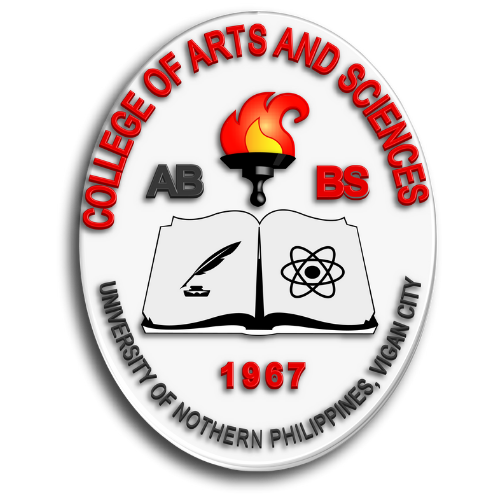
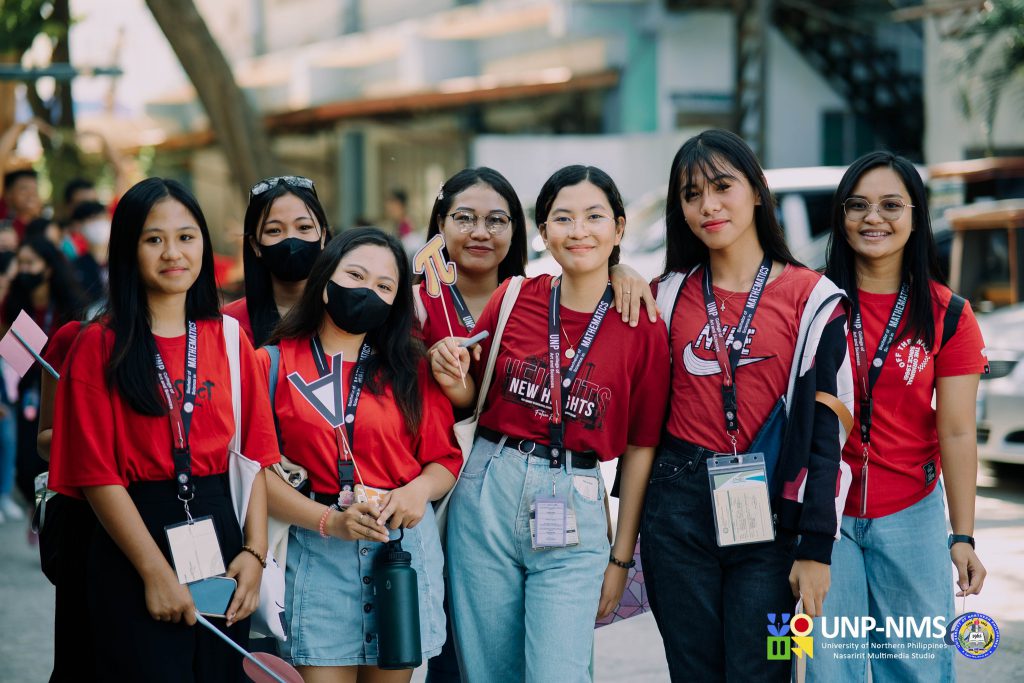
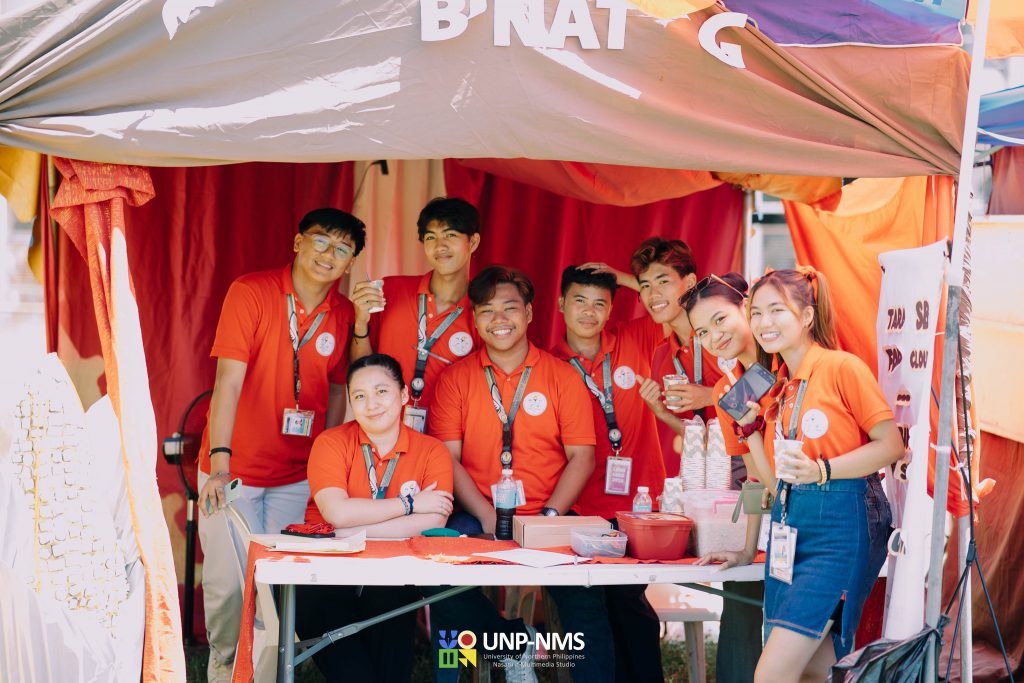
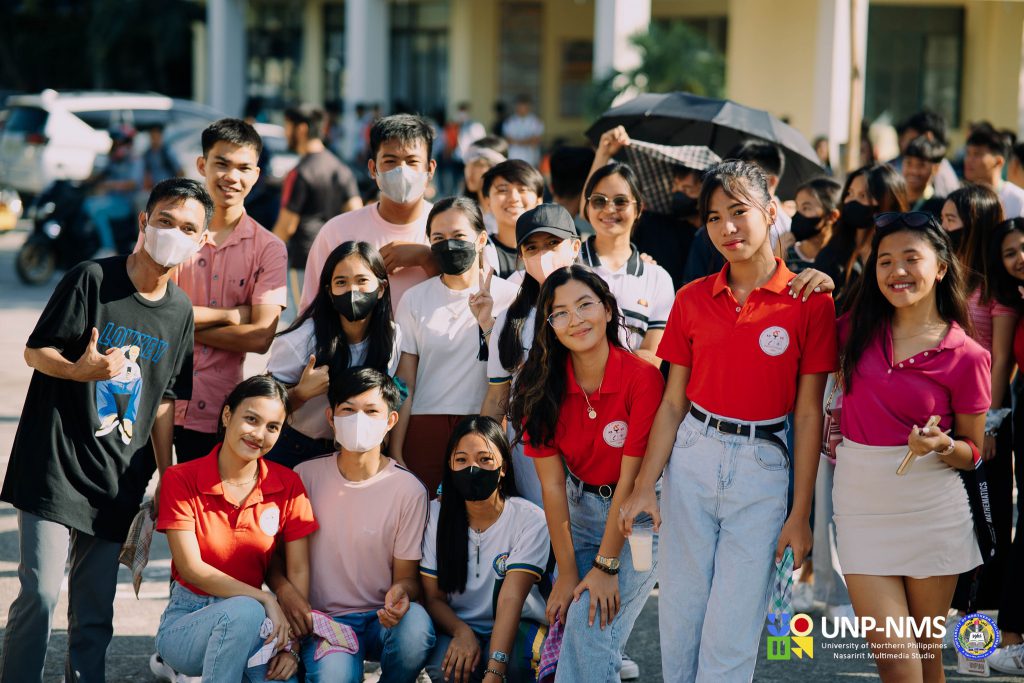
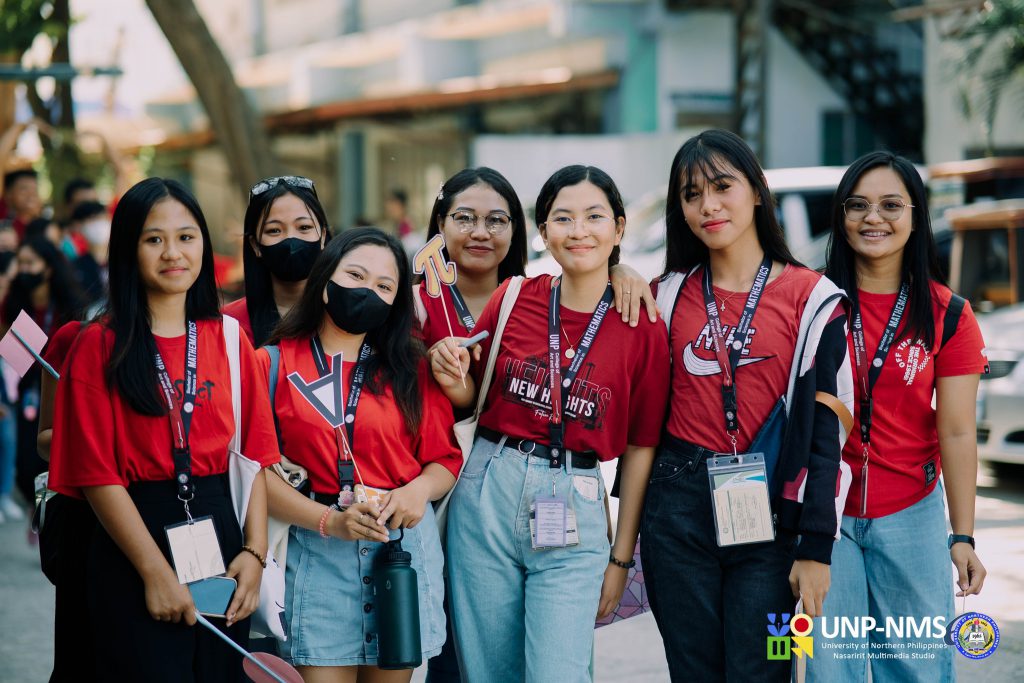
Goal
To prepare students to become responsible leaders and creative and productive citizens.
Objectives
The College aims to:
1.Provide students a firm foundation in the human and natural sciences and mathematics
2.Develop students’ competence in their field of specialization for immediate gainful employment and/or advanced studies; and
3.Instill in the students the values of social responsibility, environmental protection and cultural heritage.
History
The College of Arts and Sciences was established on January 11, 1966 by the University of Northern Philippines–Board of Regents through Resolution No. 13, s. 1996. The Resolution states that “the organization of the Colleges of Industrial Education, Arts and Sciences, and Engineering be approved in principle depending upon the availability of funds.” The College thus is among the first academic units that were established following the creation of the University through Republic Act 4449 authored by the late Congressman Floro S. Crisologo on June 19, 1965.
It started operating in SY 1967-1968 with the offering of Bachelor of Arts majors in English, Political Science, Psychology, History, and Guidance. The College also serviced all other academic units by offering the general education subjects to all first year and second year students.
In the early 70s, departments were created in the College: Departments of Languages and Humanities, Socio-Behavioral Sciences, Breeder Sciences, Mathematics, and Physical Education. Eventually, more academic units were created offering more courses including the general education subjects. In the 80s, the College started to offer Bachelor of Science in Biology, Bachelor of Science in Mathematics, and Bachelor of Science in Physics. In the 90s, programs were added in response to the needs of the times: Bachelor of Science in Computer Science (now offered by the College of Computer and Information Technology), Bachelor of Science in Environmental Science, Bachelor of Arts in Psychology (as a straight program), and the double majors AB English/Mass Communication, AB Political Science/History, and BS Mathematics/Statistics. A little later came AB in Tourism (now offered by the College of Hospitality and Tourism Management) and BS Biology (Marine).
In 2011, Bachelor of Arts in Psychology was revised to Bachelor of Science in Psychology and Bachelor of Arts in English/Mass Communication was renamed to Bachelor of Arts in Communication. In 2014, the College started offering Master of Statistics which was first offered in 1994 at the Graduate School. In 2021, Master of Arts in Guidance and Counselling, another graduate studies program was transferred to the college. It was first offered in the Graduate School as Master of Arts in Education – Guidance (MAEd) in 1975. In 2008, said program was changed into Master of Arts in Guidance and Counselling.
The College continuously reviews its curricula to conform with the policies and standards of the Commission on Higher Education. Likewise, its academic programs undergo monitoring and assessment by the Regional Quality Assurance Team (RQAT), the CHED Technical Panels for the various disciplines, and the Accrediting Agency of Chartered Colleges and Universities of the Philippines (AACCUP). The implementation of the K to 12 Curriculum resulted in the revision of the programs offered in the College based on new CMOs.
In January 2020, under the administration of Dr. Erwin F. Cadorna, the general education departments were fused with the College of Arts and Sciences. Given its new structure, the College is presently being administered by a Dean and two Assistant Deans.
The Assistant Dean for Academic Programs is assisted by the Program Heads, whereas the Assistant Dean for the General Education courses, by the Heads of the different departments (Social Sciences and Philosophy, Language and Humanities, Mathematics and Natural Sciences, and Physical Education).
It started operating in SY 1967-1968 with the offering of Bachelor of Arts majors in English, Political Science, Psychology, History, and Guidance. The College also serviced all other academic units by offering the general education subjects to all first year and second year students.
In the early 70s, departments were created in the College: Departments of Languages and Humanities, Socio-Behavioral Sciences, Breeder Sciences, Mathematics, and Physical Education. Eventually, more academic units were created offering more courses including the general education subjects. In the 80s, the College started to offer Bachelor of Science in Biology, Bachelor of Science in Mathematics, and Bachelor of Science in Physics. In the 90s, programs were added in response to the needs of the times: Bachelor of Science in Computer Science (now offered by the College of Computer and Information Technology), Bachelor of Science in Environmental Science, Bachelor of Arts in Psychology (as a straight program), and the double majors AB English/Mass Communication, AB Political Science/History, and BS Mathematics/Statistics. A little later came AB in Tourism (now offered by the College of Hospitality and Tourism Management) and BS Biology (Marine).
In 2011, Bachelor of Arts in Psychology was revised to Bachelor of Science in Psychology and Bachelor of Arts in English/Mass Communication was renamed to Bachelor of Arts in Communication. In 2014, the College started offering Master of Statistics which was first offered in 1994 at the Graduate School. In 2021, Master of Arts in Guidance and Counselling, another graduate studies program was transferred to the college. It was first offered in the Graduate School as Master of Arts in Education – Guidance (MAEd) in 1975. In 2008, said program was changed into Master of Arts in Guidance and Counselling.
The College continuously reviews its curricula to conform with the policies and standards of the Commission on Higher Education. Likewise, its academic programs undergo monitoring and assessment by the Regional Quality Assurance Team (RQAT), the CHED Technical Panels for the various disciplines, and the Accrediting Agency of Chartered Colleges and Universities of the Philippines (AACCUP). The implementation of the K to 12 Curriculum resulted in the revision of the programs offered in the College based on new CMOs.
In January 2020, under the administration of Dr. Erwin F. Cadorna, the general education departments were fused with the College of Arts and Sciences. Given its new structure, the College is presently being administered by a Dean and two Assistant Deans.
The Assistant Dean for Academic Programs is assisted by the Program Heads, whereas the Assistant Dean for the General Education courses, by the Heads of the different departments (Social Sciences and Philosophy, Language and Humanities, Mathematics and Natural Sciences, and Physical Education).
OFFICE OF THE PRESIDENT
-
University of Northern Philippines
3rd Floor- Admin Building, Tamag, Vigan, Ilocos Sur - (077) 644-2261
- op@unp.edu.ph
Registrar's Office
- registrar@unp.edu.ph
- UNP Registrar's Office
Admission Services
- admissionservices@unp.edu.ph
- UNP Admission Services
Public Information Office
- pioffice@unp.edu.ph
- University of Northern Philippines
Guidance and Counseling Services
- guidance@unp.edu.ph
- University of Northern Philippines
